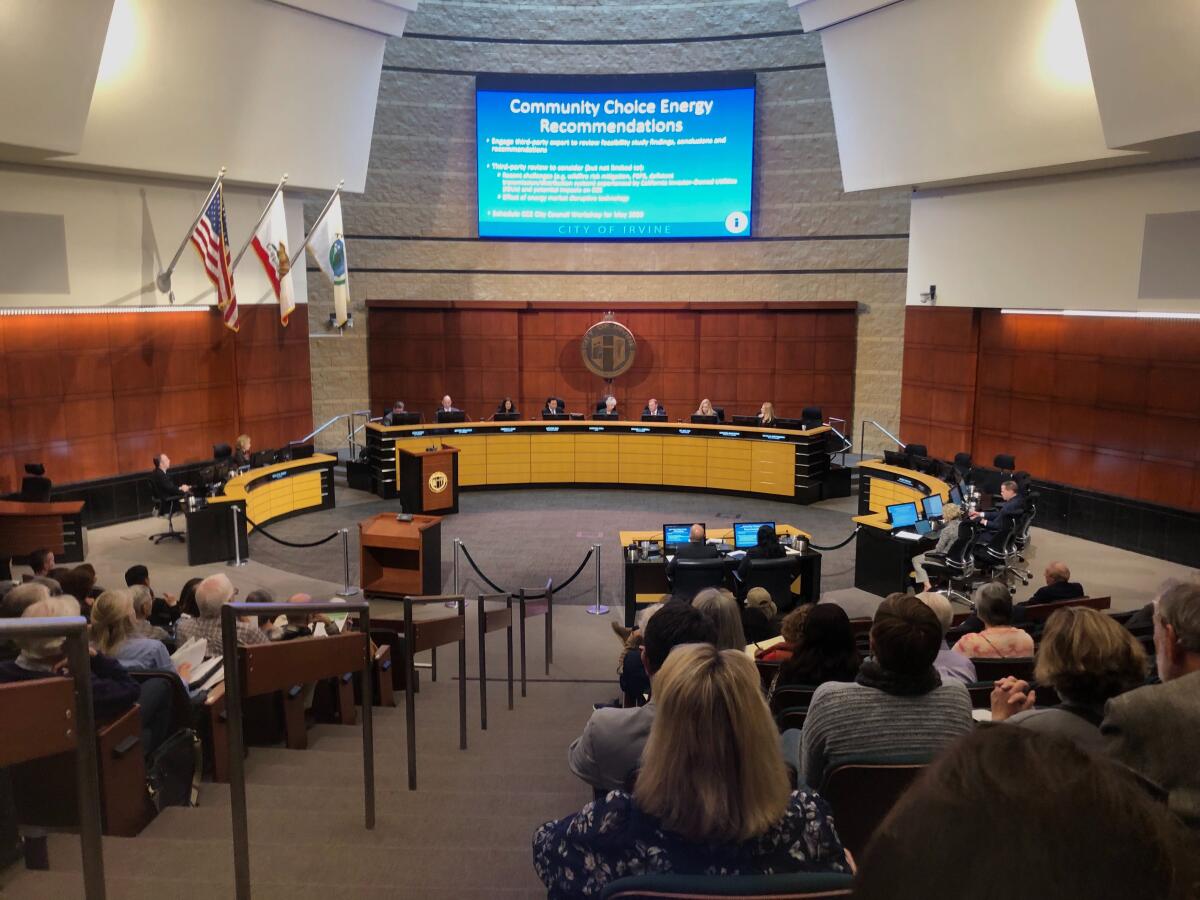Local cities to be invited to join Irvine’s move toward establishing government-run energy

- Share via
Orange County is one step closer to getting government-run energy following a move by the city of Irvine, and some neighboring cities are ready to jump aboard.
The Irvine City Council voted Tuesday to move toward establishing a community choice aggregation, sometimes referred to as community choice energy, and will invite Costa Mesa, Huntington Beach, Newport Beach and Tustin to join.
Forming a CCA enables local officials to choose what kinds of energy to buy for their communities. Participating governments get a say in setting rates and designing incentives for clean energy technologies.
Southern California Edison would continue to deliver electricity through a partnership and be responsible for building and maintaining power lines and other infrastructure as well as billing customers.
Irvine Councilman Michael Carroll motioned Tuesday to direct city staff to formally invite the four neighboring cities, which he and Councilwoman Melissa Fox said have expressed interest in Irvine’s potential CCA.
The five-member council gave staff the green light to prepare preliminary joint powers documents, the next move toward implementation. The matter is on track to be presented to the California Public Utilities Commission by Jan. 21.
“The city of Irvine prides itself as being a leader,” Carroll said. A CCA offers the potential for the city to implement a “higher mix of clean energy, if we can, and at the same time take back local control and accountability over electricity rates.”
Marin County launched California’s first CCA in 2010. There are now 19 such government-owned utility programs across the state. None is in Orange County.
Costa Mesa Mayor Katrina Foley addressed the council Tuesday to affirm her support for the move.
“We are just jealous that you are so far ahead of us on this,” Foley said.
Foley, along with Costa Mesa Councilwoman Andrea Marr, wrote a letter last week supporting the Irvine Finance Commission’s recommendation to form a joint powers authority.
“Irvine has the opportunity to join a growing number of cities that are reducing energy costs and carbon emission using community choice energy,” the letter said.
Costa Mesa is in the early stages of studying whether to embark on community choice energy, it stated.
“We are eager to keep an open and active dialogue with the city of Irvine as you move forward in this process,” the letter said.
In August, Huntington Beach City Council members Barbara Delgleize and Kim Carr proposed a CCA feasibility study in their city, and the council voted to look into CCA and directed staff to proceed with a request for proposals.
“Once we receive all the proposals back, the staff is coordinating an assessment process,” Huntington Beach City Manager Oliver Chi said Thursday.
City staff expects to present the council with the RFP results in the first quarter of 2020, Chi said. The council will then decide whether to go forward with a study.
Representatives of Newport Beach did not immediately respond to requests for comment this week.
Laguna Beach resident Ginger Osborne told the Irvine council Tuesday that her city has been
“at kind of a stalemate” in looking into CCA. “I hope that you will adopt a JPA and invite Laguna Beach to join you in this very significant move for sustainability,” she said.
“Orange County is the hole in the doughnut of CCAs” in the state, said Tom Osborne, also of Laguna Beach.
“What you do is going to be of historic importance,” he said. “It’s going to lead my city, I hope.”
Laguna Beach completed a preliminary CCA feasibility study in 2018.
“The study concluded that the potential cost savings for the city purchasing electric utility on its own could range between 4% and 6%,” Assistant City Manager and Director of Public Works Shohreh Dupuis said in an email Thursday. “However, due to a recent California Public Utilities Commission ruling on how investor-owned utilities can recover costs from customers leaving their system, this cost saving is now less than 2%.”
Costs could even rise if the city decided to buy from “greener” energy sources, she said.
“Therefore, the city of Laguna Beach is not pursuing starting or joining a CCA at this time,” Dupuis said.
Some residents and members of the Irvine council urged prudence.
“You are getting into the long-term electric generation planning business,” said William von Blasingame of Irvine, who had a career as an electricity administrator and has served on the Santa Ana Regional Water Quality Control Board since 2013.
“There is a 2% [profit] margin in this business,” von Blasingame said. “[It] is a very volatile business; it changes by the minute.”
Von Blasingame warned the council that the move would invite regulation from the Public Utilities Commission and urged the city to staff itself accordingly.
“You are going to need internal knowledge, not just consultants. ... The management of this asset is critical for the success of the city,” he said.
Participants also expose themselves to risks associated with energy market conditions, fees and other charges from Southern California Edison and ratepayers opting out of the switch.
“We have had a very, very ugly history ... with the city thinking we should get into the utility business,” said Irvine Mayor Pro Tem Anthony Kuo. “I just want to be doubly, triply, quadruply sure that everything that is being represented to us passes muster.”
“In many — not all — of the JPAs that Irvine is a part of, we get the short end of the stick. We end up footing the bulk of the bill,” Kuo added. “Our money is treated fairly, but our vote isn’t always treated fairly.”
Fundamentally, however, Kuo backed the sentiment that Irvine should claim its place as “first through the gate” in establishing alternative energy procurement in Orange County.
Fox urged the council not to delay the process too much by commissioning exhaustive reviews of previously prepared studies.
“It is sometimes the Irvine way that we have consultants over consultants and study something to death. ... I hope that’s not happening here,” Fox said, though she supported the council’s decision to review the city’s existing study.
All the latest on Orange County from Orange County.
Get our free TimesOC newsletter.
You may occasionally receive promotional content from the Daily Pilot.







